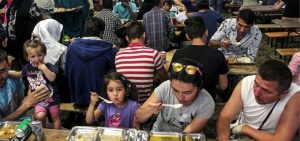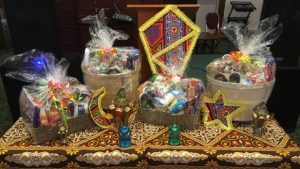LONDON – Since war first broke in the MENA region – Middle East and North Africa – millions of men, women, and children were forced to leave their homes, more often than not with little more than the clothes on their back. On the run, cut off from their land, their traditions, and their sense of identity, hundreds of thousands crossed oceans, and continents so that they could once more breathe free from the smokes of battles tearing their lives apart.
Never since World War II did the world, and most particularly Europe, witnessed a greater influx of war refugees onto its lands. As families exiled themselves in search and pursuit of safety and survival,, migration, war refugees, and the all so controversial issue of “responsibility” replaced former calls for solidarity, and compassion.
“It is often we forget how war refugees came here not out of choice, but necessity. It is often we forget that it is European-made weapons, and European-backed militants which have played a part in the MENA many wars over the years … refugees were bottle-necked into Europe. Refugees only ambition is to rebuild what was stolen from them. They only want what we all want, a future, and dignity,” said Manar Muhammad Rizvi, a researcher with the Mona Relief Organization, and translator with the UNHCR.
But what life has been like for those families who managed to make it safely out? How have they coped with their new environment, and more importantly how have people been treating their new neighbours?
This is the story of two families: Abu Laith, and Abu Muhammad.
Abu Laith – from Aleppo, Syria to London
 Abu Laith, his wife and two sons came to the UK earlier this year through Belgium. It is in England that the family was able to reunite following two years of being torn apart – two years of anguish, and solitude. Formerly from Aleppo in Syria, the family said they could not bear the idea of a life spent under the black flag of Daesh.
Abu Laith, his wife and two sons came to the UK earlier this year through Belgium. It is in England that the family was able to reunite following two years of being torn apart – two years of anguish, and solitude. Formerly from Aleppo in Syria, the family said they could not bear the idea of a life spent under the black flag of Daesh.
“We would have been killed … I do not want to think about what could have happened to us if we had stayed. Misery has befallen my beautiful Syria. We did not ask for any of this. We did not ask for our lives to be so completely ruined so that the powers that be could claim more power to themselves. We had no other alternative but leave.
Today we are eventually together, and we are all safe. By the grace of God we escaped war. By the grace of God my family is with me still … This is an emotional time for us. It is our first Ramadan in the UK.
I have to say that so far, the kindness of our community has far exceeded my expectations. Our local imam has been incredibly supportive in helping us settle in. To give a little back, my wife and I have been helping organize iftar at the mosque. We also worked on a local outreach projects in London where every evening we distribute food for the homeless.
This Ramadan it is all about reaching out to others, it is all about enacting Islam’s principles of kindness and compassion.
War has taught me one thing: there are many ways to God – who are we to claim His name? I will offer my friendship to whoever will receive it regardless of their creed or ethnicity. War has taught me that we all are minorities in the face of evil.
This Ramadan for me it is all about humbling myself before the mercy of God. I was saved … many were not. So I have now a duty of care to others. I have now a duty to spread love and extinguish hatred!”
“O you who have believed, decreed upon you is fasting as it was decreed upon those before you that you may become righteous.” [2:183]
Abu Muhammad – from Hadramawt in Yemen to London, UK

Abu Muhammad, his wife, and young daughter came from Yemen in early 2015. One of the lucky few, Muhammad holds a UK passport and as such, was able to find refuge in the UK. His wife, however, was forced to register as an asylum seeker since the Home Office refused to grant her residence.
Properly resettled in the British capital, London, Abu Muhammad has been a strong advocate against Yemen’s war – a civil engineer reborn as a human rights activist .
“I was lucky … extremely lucky to have escaped when I did. In all fairness we never expected that the war would last that long. We did not expect the devastation, and horrors which Yemen was made to suffer. If I’m perfectly honest I do feel ashamed. I am here today, safe and sound while millions of my fellow Yemenis are struggling to survive. We all carry that guilt I think. And so I have decided to put such feelings to good use by helping those less fortunate.
I am not a rich man, but I can still help others. This Ramadan for me has been about helping others, and raising awareness about Islam, and about Yemen.
There are tens of thousands of new refugees of war arriving in Europe every month, we cannot ignore their plight. We cannot call ourselves civilized and just if we cannot recognize others’ right to a dignified future. We cannot claim God and look away when called upon!
I have worked within my community to help refugees of war find work, to settle, make new friends, and a decent place to live. Through such community activities I came across all sorts of people – interestingly enough my local mosque has worked quite a lot with Christian refugees from Syria and Iraq. Many new arrivals were turned away by Christian organizations and so the mosque reached out to them.
This year we are eating iftar all together! It is a real joy to see that war did not break us, and instead brought us closer together. I have found a new respect for my Christian neighbours. There is an understanding, a commonality which I did not experience before.
It is how we rise from our struggles which matters! I decided this year to mark Ramadan by answering questions related to hatred, bigotry and radicalism, by joining in with other religious communities. Through their friendships I have come closer to God.
“Many persons get nothing out of their fasts but hunger and thirst, many more get nothing out of their night prayers but exertions and sleepless nights. Wise and sagacious persons are praiseworthy even if they do not fast and sleep during the nights.” [Imam Ali ibn Abi Talib, NahjulBalagha, 144]
